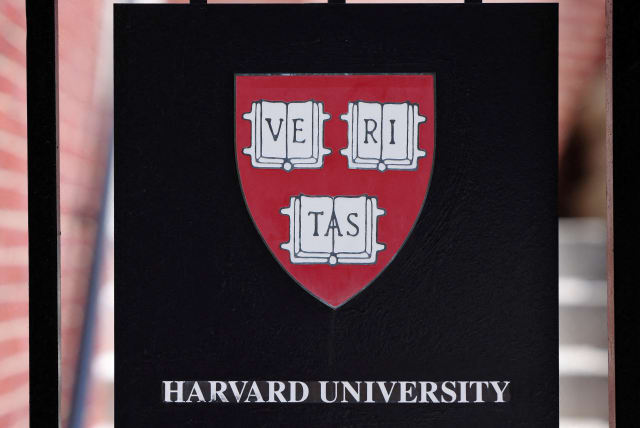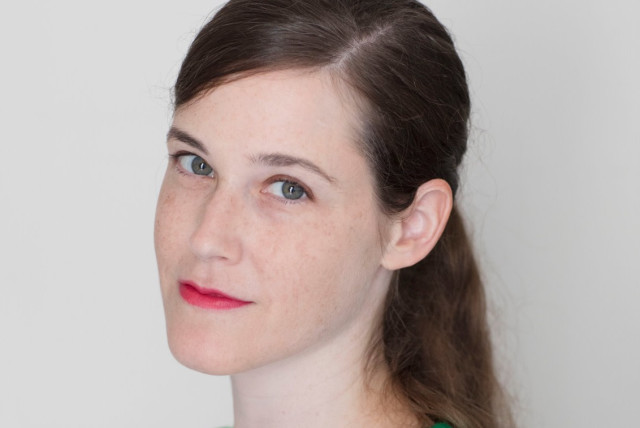From Hamas to Harvard: Israeli satirist exposes insane depths of ‘inclusivity’

“I was expecting him to hang up really early in the conversation and he just didn’t … I had to add worse and worse questions and he just went with it.”
Amid the sharply rising reports of antisemitism in the West, particularly on college campuses, a now-viral prank call to Harvard University’s admissions office seeks to answer the question: “At what point does ‘Diversity, Equity, and Inclusion’ go too far—effectively inviting the wolf into the henhouse?”
The answer (for Harvard) seems to be: “never.”
“I just want to emphasize again, that it’s a real call. A lot of people asked if it was a sketch or staged,” says satirist and journalist Racheli Rottner, speaking with The Media Line. Rottner came up with the concept, voiced the call, and animated it in what’s become her signature minimalist style, for Israeli news site Mako where she works. The animation was posted on YouTube.
In the recorded conversation, Rottner poses as “Jamaa,” who calls on behalf of her Hamas terrorist son “Hameed,” in hopes of securing financial aid for his ‘deeds’ ahead of the coming registration period.
“Following the publications about Hamas-supporting students at Harvard University, we called to find out if it was possible to get a massacre scholarship,” Rottner said.
“I think you might have heard of him? He was one of the Hamas fighters who participated in the fight of October 7 … a real political activist,” says Jamaa. “So I wanted to ask if you have some kind of a political activism scholarship?”
Fielding the question seriously, the admissions officer dryly responds that “all the scholarships are needs-based. There aren’t any merit-based scholarships.”
When pushed on whether “it would not help if he said he was a Hamas fighter?” the admissions officer clarifies that “everything a student does helps them in the process.”
Pressing for further clarity, Jamaa asks: “So it would be helpful, if he wrote down that he was in the October 7 massacre? … It would be considered an advantage?”
Again, the officer repeats that “...in addition to everything else, our process looks at the student’s entire secondary school career, both inside and outside the classroom … we’d look at all of their activities.”
It only gets worse. Rottner explains that in many of her prank calls, she looks for the red line where the recipient will hang up—as it provides a punchline moment. And here, “I was expecting him to hang up really early in the conversation and he just didn’t,” Rottner tells The Media Line. “I had to add worse and worse questions—and he just went with it.”
“Don’t worry, he didn’t rape any captives,” adds Rottner as Jamaa. “He’s very respectful of gender self-definition. He only killed them! He’s very feminist. So it will be OK, right?”
“All I can say is he can apply …” the officer responds—clearly uncomfortable but unwilling to end the call.
So Jamaa escalates. “He’s very respectful of ethnic minorities, he only killed white babies. We don’t need more white males in the world, right?” After a moment of silent dumbfoundedness, the officer changes the subject. “Do you have any other admissions questions I can answer for you?”
Still waiting to cross that red line, “I didn’t really know what else to say [so] I just improvised,” Rottner says; this time going on to equivocate between rape, killing babies, and wearing a hat. No matter what, the officer remains on the line, providing legitimacy to the inquiries.
But this absurdist “indifference” becomes the message in the joke, says Rottner. “It’s the civilization where hanging up on someone in the middle of a phone call is worse than killing babies.”
Rottner emphasizes that Harvard was not the target of the satire, either … but rather the extreme ends of a policy of political correctness. “It’s not that I think Harvard supports Hamas or its actions, but it’s absurd that they’re trying to be OK with everybody in hopes that everything will be OK as long as we’re polite—and it won’t be.”
Why Harvard?
The video comes roughly one month after the October 7 massacre. In the event, now known as ‘Black Sabbath,’ thousands of Hamas terrorists infiltrated southern Israeli communities, where they brutally raped, beheaded, tortured, burned alive, and indiscriminately shot at anyone and everyone in their view. Over 1,200 people were murdered—mostly civilian men, women, and children. Thousands more were injured, and some 240 were taken hostage into Gaza, including a 9-month-old baby, pregnant women, and Holocaust survivors.
In the wake of the atrocity, hundreds of thousands of Israeli army reservists were called upon to join the counteroffensive, leaving many businesses with a shortage of staff. Rottner, who continued her work at Mako, had been redirected to fill in the gaps of manpower—focusing on ‘serious’ stories as opposed to her usual satire.
“Since October 7 … I was replacing editors and journalists from other sections of the site … So [Mako] wouldn’t allow me to do anything funny and I couldn’t think of anything funny. I just did health articles, financial articles, etc. [But] I really missed ‘my thing’ … and I got the idea to do a prank call which was related to the war but not actually about the war,” says Rottner.
“At first I thought I’d prank call Hamas,” she explains, but that proved to be too tall an order. Not only because she wasn’t sure who to call, but also because it might spark further conflict.
Inspiration for Harvard struck, then, after watching American Jewish actress Mayim Bialik’s confessional in which she discusses antisemitism in America and how she feels like a stranger in her own country. Particularly in the wake of incidents at Harvard—Bialik’s alma mater—where Hamas supporters and anti-Israel demonstrators had become increasingly hostile toward Jewish and Israeli students.
Less than 24 hours after the October 7 attack, 33 Harvard student organizations signed onto an open letter that held “Israel entirely responsible for all unfolding violence …” adding that “Today’s events did not occur in a vacuum.”
The letter mentions neither Hamas, nor the terrorist organization’s atrocities, nor the taking of hostages—which constitute war crimes and arguably, crimes against humanity. There has been a sharp spike in similar letters, antisemitic attacks, and incidents of harassment toward Jewish students on the campuses of Harvard and other universities, as well.
In one video filmed at Harvard, a Jewish student is physically accosted and surrounded by classmates, including Ibrahim Bharmal, the editor of the Harvard Law Review and Elom Tettey-Tamaklo, a student at the Harvard Divinity School, who block his path, entrap him, and scream “shame, shame, shame.”
In another video, Harvard students openly call for intifada, referring to the two violent uprisings against Israel from 1987-1993, and from 2000-2005, which were characterized by suicide bombings, bus bombings, shootings, stabbings, grenade attacks, stonings, Molotov cocktail attacks, and other terror attacks against civilians; as well as a heavy crackdown on the Palestinian Arabs by Israeli forces.
In the wake of the university’s seemingly weak reproach, tens of millions of dollars in donations to the university have been withdrawn or threatened.
“[But] again, Harvard is not the issue here,” says Rottner. “It’s the concept in a world that really doesn’t understand … what it’s like to be at war—real war—constantly. And [for] people from Western countries where everything is comfortable and polite. … For them, being politically incorrect is the worst thing that can happen.”
And this Western mentality is too often projected onto unrelated issues, Rottner explains.
“If we’re doing something to Arabs then it must be a racist thing [in Western minds]. But it’s a different context for us here. For us, it’s life and death. It’s not about discussing your preferences, or pronouns, or being inclusive to everyone in your new coffee commercial … These are important things, but they can’t replace the concept of real life-and-death experiences in war zones.”
Responding to The Media Line’s request for comment, Harvard Hillel writes in a statement, “Supporting our students is at the core of our mission at Harvard Hillel. From the moment we learned about the terrorist attack unfolding in Israel, our students’ physical and emotional health and safety have remained our priority. Our dedicated staff team of rabbis and Jewish professionals are widely available to help students process what happened, and students are gaining solace in community. From a moving vigil on the steps of Widener Library on Monday; to the statement (spearheaded by Harvard Hillel students and signed by more than 3,000 Harvard affiliates) condemning that of the Palestinian solidarity groups, our community is coming together and creating space for healing. We know first-hand that our campus community is safest and our students are best supported when leaders in university administration and student organizations speak out unequivocally against violent hate. In our continued conversations with Harvard leadership, we will emphasize the need to forcefully condemn antisemitism and this heinous terrorist attack. As we do so, the needs of our students are top of mind.”
Harvard University has yet to respond to The Media Line’s request for comment.
Jerusalem Post Store
`; document.getElementById("linkPremium").innerHTML = cont; var divWithLink = document.getElementById("premium-link"); if (divWithLink !== null && divWithLink !== 'undefined') { divWithLink.style.border = "solid 1px #cb0f3e"; divWithLink.style.textAlign = "center"; divWithLink.style.marginBottom = "15px"; divWithLink.style.marginTop = "15px"; divWithLink.style.width = "100%"; divWithLink.style.backgroundColor = "#122952"; divWithLink.style.color = "#ffffff"; divWithLink.style.lineHeight = "1.5"; } } (function (v, i) { });

